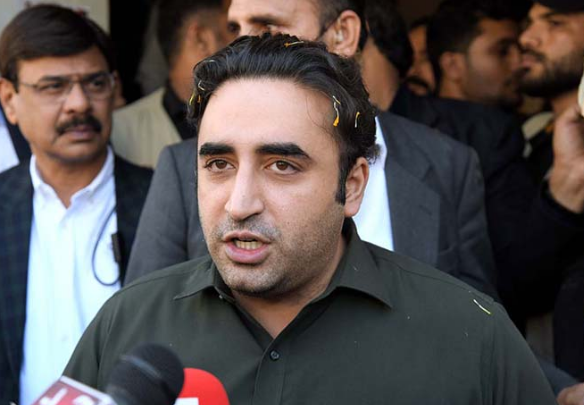Islamabad (Web Desk): Pakistan People’s Party (PPP) Chairman Bilawal Bhutto Zardari on Wednesday termed the Supreme Court’s (SC) opinion on the Zulfiqar Ali Bhutto reference as historic and expressed the hope it would help Pakistan progress on all fronts.
Talking to media after the announcement of the SC ruling, he said history was set to be corrected after 44 years.
Headed by Chief Justice of Pakistan (CJP) Qazi Faez Isa, a nine-judge bench had recently taken up the reference filed in April 2011 on behalf of former president Asif Ali Zardari seeking an opinion under the top court’s advisory jurisdiction on revisiting the death sentence awarded to the PPP founder.
“The court has accepted that Bhutto didn’t get a fair trial,”. the PPP chief said, that it was difficult for ordinary people to trust the judicial system when a popular leader like Bhutto couldn’t get justice.
Meanwhile in a post on social media platform X (formerly Twitter), Bilawal said that the SC’s opinion came “44 years after judicial murder and more than 12 years after the presidential reference was filed.”
“The pursuit of justice was a labour of love by (former) President Asif Ali Zardari in the name of his wife Shaheed Mohtarma Benazir Bhutto. Our family waited 3 generations to hear these words.”
Meanwhile, Prime Minister Shehbaz Sharif on Wednesday congratulated the leadership and workers of the PPP and said that by admitting the mistake in Zulfikar Ali Bhutto’s trial, the Supreme Court’s opinion on the presidential reference has set a new history and tradition.
In a statement, the prime minister congratulated Bilawal Bhutto Zardari, President-designate Asif Ali Zardari, PPP leadership and workers for the Supreme Court’s observation that former Prime Minister Zulfiqar Ali Bhutto did not get a fair trial.
“It is not possible to correct the past mistake but by admitting the serious mistake, a new history and a new tradition have been set,” PM Shehbaz said.
He said that rectification of an injustice of a court by the court was a positive development.
“The unanimous opinion of the Supreme Court in the Bhutto reference will help understand the history at the national level through the right perspective. The process of national unity and development can be accelerated only by correcting the past mistakes and doing away with the bitterness,” the premier added.
Earlier today, a nine-member larger bench of the SC, headed by Chief Justice of Pakistan (CJP) Qazi Faez Isa, observed that that the (PPP founder Zulfikar Ali Bhutto, executed by General Ziaul Haq’s military regime in 1979, was not given a “fair trial” chance by the courts.
It is pertinent to mention that the court’s decision comes after nearly 12 years.
On April 2, 2011, then-president Asif Ali Zardari had approached the apex court through a presidential reference under Article 186 of the Constitution of Pakistan to seek its opinion on revisiting the trial of the PPP founder.
It was filed before the top court under Article 186 (1 and 2) of the Constitution, which empowers the president to refer any question of public importance to the Supreme Court to seek its opinion on an issue.
Zulfikar Ali Bhutto, who took over as president of Pakistan immediately after the fall of Dhaka in December 1971, and later became the prime minister after the 1973 Constitution, was removed from the government through the martial law imposed on July 5, 1977, led by General Ziaul Haq.
On September 3, he was arrested in the case of the March 1974 murder of Nawab Muhammad Ahmad Khan Kasuri. He was released 10 days later after a court found the charges against him "contradictory and incomplete". He was rearrested on the same charges and arraigned before the Lahore High Court (LHC).
On March 18, 1978, ZA Bhutto was declared guilty of the murder and was sentenced to death.
The decision was challenged in the SC and on February 6, 1979, the top court voted 4-3 to issue a guilty verdict and upheld the LHC's decision.
On March 24, 1979, the SC dismissed the appeal and Gen Zia upheld the death sentence.
Zulifikar Ali Bhutto was hanged at the Rawalpindi Central Jail on April 4, 1979, and was buried at his family mausoleum in Garhi Khuda Baksh, Larkana.


